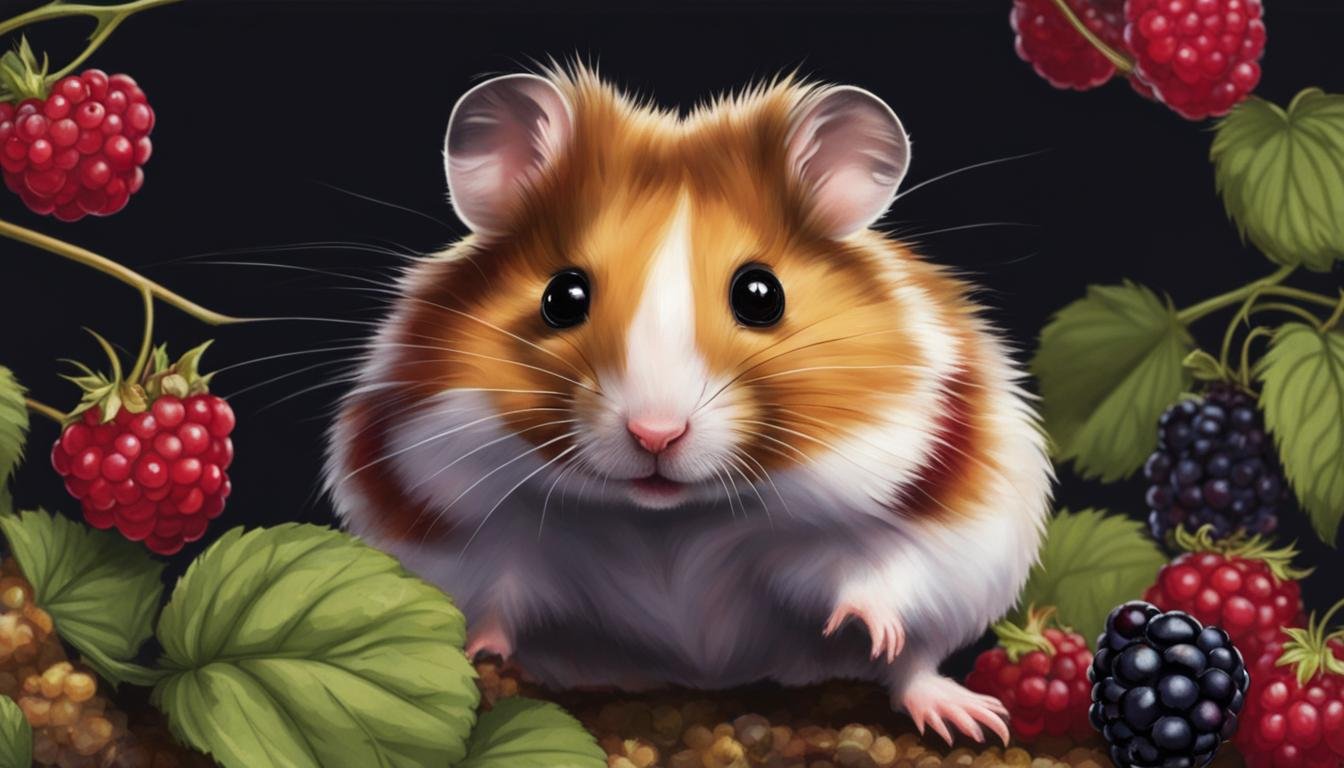Can Hamsters Eat Blackberries? Safe Treat Tips
As a hamster owner, you might want an answer to the question: “Can hamsters eat blackberries?”
Well, the answer is yes, hamsters can indeed eat blackberries. However, there are a few things you should keep in mind when including this juicy treat in their diet.
Blackberries contain sugar, so it’s important to feed them to your hamster in moderation. Too much sugar can cause digestive problems and upset their delicate little tummies.
Therefore, it’s best to introduce blackberries slowly and offer them in small portions. While blackberries are considered a “superfood” for humans, for hamsters, they are more like a special treat.
Blackberries do have some nutritional value for hamsters. They contain beneficial nutrients, fiber, and antioxidants.
Key Takeaways
- Hamsters can safely eat blackberries but in moderation.
- Blackberries are high in sugar, so they should be introduced slowly and offered in small portions.
- Blackberries are considered a treat for hamsters, not a staple food.
- They contain beneficial nutrients, fiber, and antioxidants.
- Blackberries have a lower sugar content compared to other fruits, making them a healthier option.
Benefits of Blackberries for Hamsters

Blackberries are not only delicious for humans, but they can also offer some benefits to our furry friends, hamsters. These tiny berries are packed with essential nutrients that can contribute to a hamster’s overall health.
Blackberries are a great source of vitamins for hamsters. They contain vitamin C, which is essential for boosting the immune system and keeping hamsters healthy and active. Additionally, blackberries also provide vitamins A and K, which support proper growth and development.
Furthermore, blackberries are rich in dietary fiber, making them a valuable addition to a hamster’s diet. Fiber plays a crucial role in maintaining a healthy digestive system and preventing constipation, which is a common issue in hamsters. Including blackberries in their diet can help regulate their bowel movements and promote a healthy gut.
Another key benefit of blackberries for hamsters is their antioxidant content. Antioxidants help protect cells from damage caused by harmful molecules called free radicals. By incorporating blackberries into their diet, hamsters can enjoy the antioxidant benefits that contribute to their overall well-being.
It is important to note that while blackberries offer these benefits, they should be considered as a treat rather than a primary food source for hamsters. They should be given in moderation and as part of a balanced and varied diet. Too many blackberries can lead to digestive issues, so it’s essential to monitor your hamster’s intake and adjust accordingly.
Remember, each hamster is unique, and their tolerance to certain foods may vary. As with any new addition to their diet, it’s important to introduce blackberries gradually and observe how your hamster reacts. If you notice any signs of discomfort or digestive upset, it’s best to consult with a veterinarian.
How to Offer Blackberries to Hamsters
When introducing blackberries to hamsters, it is important to do so slowly and with portion control to ensure their safety and enjoyment. Follow these steps to offer blackberries to your hamster:
- Start with half a blackberry: Begin by offering your hamster half of a blackberry to see if they enjoy the taste and have no digestive issues. This allows you to gauge their reaction before increasing the portion size.
- Gradually increase the portion size: If your hamster tolerates the blackberry well, gradually increase the portion size over time. Monitor their response to ensure it doesn’t cause any digestive upset.
- Stick-to-treat quantities: Remember, blackberries should be considered a treat for hamsters and should not exceed 10% of their normal diet. This ensures they receive a balanced and varied diet.
- Offer blackberries 2-3 times a week: It is recommended to offer blackberries to your hamster 2-3 times a week. This provides them with a treat while limiting the risk of digestive issues or diarrhea.
- Provide fresh and washed blackberries: Always provide fresh blackberries that have been thoroughly washed to remove any potential pesticides or residue. Ensuring the freshness of the blackberries contributes to the overall health of your hamster.
- Remove uneaten portions: If your hamster does not finish the blackberries within a few hours, remove any uneaten portions to prevent spoilage. This helps maintain a clean and hygienic environment for your pet.
Other Fruits Hamsters Can Eat
In addition to blackberries, hamsters can enjoy a variety of other safe fruits as part of their diet. These fruits offer a delicious and nutritious way to add variety to their meals.
Just like with blackberries, it is important to introduce these fruits slowly and in small portions to ensure they agree with the hamster’s digestive system.
Here are some other fruits that are safe for hamsters to eat:
- Apples (without seeds)
- Apricots
- Bananas
- Blueberries
- Cherries (without pits)
- Figs
- Honeydew melons
- Kiwis
- Mangos
- Nectarines
- Papaya
- Watermelons
These fruits not only provide a delicious taste but also offer various nutrients and vitamins that contribute to a well-rounded diet for your furry friend.
Fruits to Avoid for Hamsters
While hamsters can safely enjoy a variety of fruits, it’s important to be aware of the ones that can be toxic or harmful to them.
Some fruits should be avoided altogether as they can cause digestive issues or even be fatal to hamsters.
- Rhubarb Leaves: Rhubarb leaves contain high levels of oxalic acid, which can be toxic to hamsters. It’s best to keep these away from your furry friend.
- Dried Fruits: Dried fruits are concentrated in sugars, which can upset a hamster’s delicate digestive system. Stick to fresh fruits to ensure their well-being.
- Apple Seeds: Apple seeds contain small amounts of cyanide, which can be harmful to hamsters if consumed in large quantities. Remove seeds before offering apples to your pet.
- Apple Skin: While the flesh of apples is safe for hamsters, the skin can be difficult for them to digest. It’s best to peel apples before offering them.
- Oranges, Lemons, and Limes: Citrus fruits can cause digestive upset for hamsters due to their acidity. It’s best to avoid offering these fruits to your furry friend.
The Importance of a Balanced Hamster Diet
A balanced diet is crucial for the overall health and well-being of hamsters. Just like humans, hamsters require proper nutrition to thrive and maintain good health. It is essential to provide them with a balanced hamster diet that includes all the necessary nutrients they need for their unique digestive needs.
The foundation of a hamster’s diet should consist of high-quality pellets formulated specifically for hamsters. These pellets are designed to provide the essential vitamins, minerals, and nutrients that hamsters require for their well-being. Including pellets as the main component of their diet ensures that they receive adequate nutrition daily.
In addition to pellets, hamsters can also benefit from consuming small amounts of fresh greens, root vegetables, and fruits. These foods provide additional vitamins, minerals, and fiber to support their overall health. However, it’s important to note that fruits, including blackberries, should not exceed 10% of their regular diet. This helps maintain a balanced intake of nutrients without overloading their system with excess sugar.
Including a variety of foods in their diet can provide enrichment and help prevent nutritional deficiencies. Hamsters can also benefit from small amounts of animal protein, such as mealworms, which can be included as a supplement to their diet. However, it’s important to ensure that the protein sources are appropriate and safe for hamsters.
The Nutrients for Hamster Well-being
- Vitamins: Hamsters require a variety of vitamins, including vitamin C, vitamin A, and vitamin D, to support their immune system, promote healthy growth, and maintain proper organ function.
- Minerals: Essential minerals like calcium, phosphorus, and iron are crucial for hamsters’ bone health, muscle function, and overall vitality.
- Fiber: Adequate fiber intake helps promote healthy digestion and prevents issues like constipation in hamsters.
- Protein: Protein is necessary for muscle development, tissue repair, and overall growth in hamsters.
A good diet supported by a variety of foods helps hamsters lead a happy and healthy life.
Final Thoughts
In conclusion, hamsters can safely eat blackberries as a treat. Blackberries offer some nutritional benefits, such as vitamins, minerals, fiber, and antioxidants. However, it is important to remember that blackberries should be fed in moderation and not exceed 10% of the hamster’s normal diet.
Along with blackberries, other fruits can be included in a hamster’s diet for variety, including apples, apricots, bananas, blueberries, and watermelons. These fruits should also be introduced slowly and in small portions to ensure they agree with the hamster’s digestive system.
On the other hand, it is crucial to be aware of fruits that are toxic or harmful to hamsters. For example, avoid feeding them rhubarb leaves and dried fruits, as they can cause digestive issues or even be fatal for hamsters.







